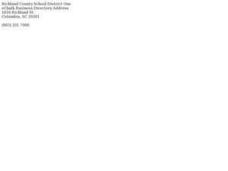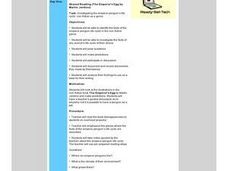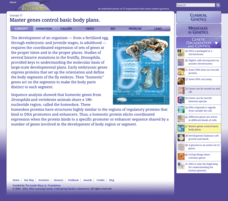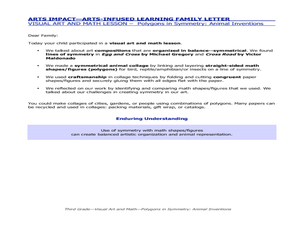Curated OER
An Egg is Quiet
Learners discover information about animal eggs by reading the book, An Egg is Quiet. In this animal science lesson, students research different animals to find out what their eggs look like. Learners use a provided chart to...
Curated OER
It Started as an Egg
Learners investigate animals that hatch from eggs. In this hatching animals lesson plan, students investigate which animals are born alive and which hatch from eggs. Learners read It Started As An Egg and practice reading comprehension...
Curated OER
Hatched From An Egg
Students discover how animals are born/hatched. In this life science lesson, students listen to a book entitled Chickens Aren't The Only Ones, and discuss animals that are hatched or born. Students receive a picture of an animal,...
Curated OER
The Emperor's Egg by Martin Jenkins
Students explore the penguin life cycle. In this penguin life cycle lesson, students read the book The Emperor's Egg by Martin Jenkins. Students look at the pictures and make predictions. Students identify facts about penguins and do...
Curated OER
Butterfly, Butterfly: Teaching Vocabulary
Kindergarteners practice new words through listening to and reading the science book Butterfly by Jenny Feely. The teacher will first choose words that are essential for understanding the text. Then, using pictures in the text,...
Curated OER
Children's Literature Across the Curriculum Ideas: Chickens Aren't the Only Ones
Students read Chickens Aren't the Only Ones by Ruth Heller. They complete a variety of cross-curricular activities surrounding the study of animals that come from eggs. Included are reading, art, math, science, writing, social studies,...
Curated OER
Introduce Vocabulary: The Emperor's Egg
Learners examine vocabulary words. In this language arts lesson, students listen to The Emperor's Egg. Learners discuss the meanings of the vocabulary words and use them in sentences.
Curated OER
Eggs
Students know the following parts of an egg as the yolk, white, shell, membrane, chalaza, and air sac. They also sequence the growth of the chick in the egg. An egg is broken and students touch, smell and see it. They locate the six...
Curated OER
So You Think You're Tough
Fourth graders learn how to classify animals. In this invertebrates lesson, 4th graders discuss how we classify thinks into groups and move into a discussion about classifying animals. Students learn about the differences between...
Curated OER
Finding Equal Groups
Build counting fluency in your kindergartners with this counting and grouping timed learning game. Provide various groups of objects to count such as a clear plastic bag filled with 7 beans or a cup with 5 pennies. There are many other...
Cornell University
Let’s Raise Lacewings
Young entomologists explored beneficial insects and how they help control pests in the first lesson of the series. Now class members take a close look at the lacewing, which is a beneficial insect.
Curated OER
See Turtles Nest! See Turtles Hatch!
Young scholars graph data of sea turtles hatching rates from Watamu/Malindi Marine National Park and Reserve in Kenya. In this math lesson, students use real life science data to calculate mean and median values. Young...
K5 Learning
The Life Cycle
Studying plant, animal, or insect life cycles? Pair a science unit with a reading comprehension worksheet on life cycles. The passage touches briefly on butterfly, plant, frog, and dog life cycles before prompting readers to answer six...
K5 Learning
Humming Birds
Seeing a hummingbird in the wild can be a magical experience. Learn more about these delicate members of the animal kingdom with a short reading passage, complete with four short-answer questions.
Dr. Seuss Enterprises
Read Across America
Celebrate the whimsical world of Dr. Seuss on Read Across America Day with a collection of science, technology, engineering, the arts, and mathematics activities, each linked to a popular Dr. Seuss story.
Curated OER
Who's Who? Integrated Core
Student discuss names and nicknames for human and animal families and complete a worksheet, matching pictures of father, baby and mother animals.
Curated OER
Turtle and Tortoise Preschool Lesson Plan
One of the best parts about teaching the littlest learners is that you can create thematic lessons that use one topic to address every subject. Here is a nice set of thematic teaching ideas that uses turtles and tortoises to teach...
Centers for Disease Control and Prevention
Understanding the Epidemiologic Triangle through Infectious Disease
Introduce infectious diseases and the epidemiologic triangle. A helpful resource describes the agent, host, and environment from the three vertices as well as the time factor, which is in the middle. Scholars complete a simple...
Cold Spring Harbor Laboratory
Master Genes Control Basic Body Plans
Have you ever been so tired you missed a major announcement? Eric Wieschaus woke to a call explaining he won the Nobel Prize, but he thought it was just a dream until Christiane Nusslein-Volhard, a co-winner, explained it to him later...
Curated OER
Butterfly Life Cycle
Focused little scientists will flitter their arms back and forth across the room with excitement as they learn the life cycle of a butterfly and how living things grow and change over time.
Curated OER
Facial Symmetry
Learners study facial symmetry. They explore lines of symmetry, and create illustrations with multiple lines of symmetry.
Curated OER
Polygons in Symmetry: Animal Inventions
Fourth graders use polygons to create animal figures with symmetry. In this polygons and symmetry lesson, 4th graders create a symmetrical animal collage by cutting and gluing geometric shapes and figures from math activities.
Curated OER
Bird Fun Facts
Students read fun facts about birds. In this bird characteristics instructional activity, students answer questions about the reading. Students complete a worksheet to find the bird nest and the matching bird.
Curated OER
Food Chain: what's for dinner?
Fourth graders identify where foods came from and sequence a food chain. In this food chain lesson, 4th graders define vocabulary related to food chains and order a food chain. Students follow the energy of a food chain. Students...























